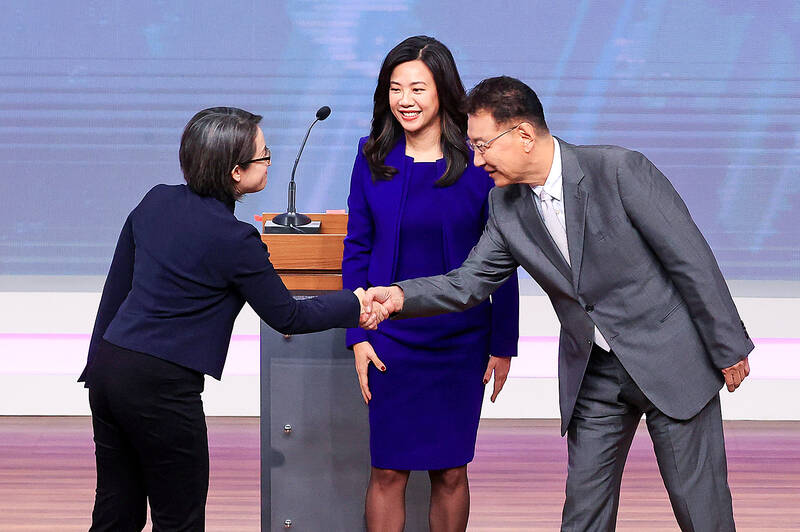Opposition vice presidential candidates challenged the government’s energy policy during Monday’s televised debate, while the ruling Democratic Progressive Party’s (DPP) vice presidential candidate questioned their positions on nuclear power.
Since taking power in 2016, the government’s energy policy has focused on phasing out nuclear power and running an electricity mix of 50 percent natural gas, 30 percent coal and 20 percent from renewable energy sources by next year.
Opposition parties have criticized the policy, especially as the rollout of renewable energy sources has lagged behind schedule, arguing in favor of maintaining Taiwan’s nuclear power generation capabilities.

Photo: EPA
The DPP’s candidate, Hsiao Bi-khim (蕭美琴), questioned the Chinese Nationalist Party’s (KMT) nuclear energy policy and asked how it could support its claims.
KMT presidential candidate Hou You-yi (侯友宜) has proposed raising the proportion of nuclear power in the nation’s energy mix to 18 percent by 2050, while his running mate, Jaw Shaw-kong (趙少康), has endorsed a target of 25 percent, said Hsiao, a former representative to the US.
She asked whether more nuclear power plants would have to be built to meet those targets and where the nuclear waste would go.
“The [five] DPP-governed cities and counties have all rejected the idea of building new nuclear power plants. Do KMT mayors and county commissioners agree to have new nuclear power plants in their cities and counties?” Hsiao asked.
Jaw said each of Taiwan’s three nuclear power plants that were or remain active could have housed four reactors instead of two, and that the mothballed Fourth Nuclear Power Plant was originally designed to house eight reactors, implying no new facilities would have to be built.
The Broadcasting Corp of China chairman said that the residents of Pingtung County’s Hengchun Township (恆春) who live close to the Ma-anshan Nuclear Power Plant support its continued operation, because they get subsidies without being exposed to health risks, as nuclear power is safe.
Jaw was referring to remarks by the Hengchun Township mayor in August that at least 70 percent of local residents supported the plant’s continued operation.
The two reactors at that plant are scheduled to stop operating in July and May next year when their 40-year operating permits expire.
Regarding nuclear waste, Taiwan should follow the US’ strategy of burying it deep in the ground, Jaw said.
Taiwan’s three nuclear power plants accounted for 16 to 20 percent of all power generated in the nation from 2000 to 2014, and 11 to12 percent from 2016 to 2021 after the first plant’s permits expired and it was shut down.
Taiwan People’s Party Legislator and vice presidential candidate Cynthia Wu (吳欣盈) called the “no nuclear homeland” proposal an ideology that has forced the acceleration of the development of renewable power installations, resulting in corruption and misconduct.
She said that as the economy relies heavily on the manufacturing sector, Taipei has to be realistic in terms of its energy policy.

Taipei has once again made it to the top 100 in Oxford Economics’ Global Cities Index 2025 report, moving up five places from last year to 60. The annual index, which was published last month, evaluated 1,000 of the most populated metropolises based on five indices — economics, human capital, quality of life, environment and governance. New York maintained its top spot this year, placing first in the economics index thanks to the strength of its vibrant financial industry and economic stability. Taipei ranked 263rd in economics, 44th in human capital, 15th in quality of life, 284th for environment and 75th in governance,

The Sports Administration yesterday demanded an apology from the national table tennis association for barring 17-year-old Yeh Yi-tian (葉伊恬) from competing in the upcoming World Table Tennis (WTT) United States Smash tournament in Las Vegas this July. The sports agency said in a statement that the Chinese Taipei Table Tennis Association (CTTTA) must explain to the public why it withdrew Yeh from the WTT tournament in Las Vegas. The sports agency said it contacted the association to express its disapproval of the decision-making process after receiving a complaint from Yeh’s coach, Chuang

Control Yuan Secretary-General Lee Chun-yi (李俊俋) tendered his resignation last night, admitting that he had misused a government vehicle, as reported by media. His resignation was immediately accepted by the Control Yuan. In a statement explaining why he had resigned, Lee apologized for using a Control Yuan vehicle to transport his dog to a pet grooming salon on May 20. The issue first came to light late last month, when TVBS News reported that Lee had instructed his driver to take the dog to the salon. The news channel broadcast photos that it said were taken by an unnamed whistle-blower, which purportedly showed the

A former officer in China’s People’s Liberation Army (PLA) who witnessed the aftermath of the 1989 Tiananmen Square massacre has warned that Taiwan could face a similar fate if China attempts to unify the country by force. Li Xiaoming (李曉明), who was deployed to Beijing as a junior officer during the crackdown, said Taiwanese people should study the massacre carefully, because it offers a glimpse of what Beijing is willing to do to suppress dissent. “What happened in Tiananmen Square could happen in Taiwan too,” Li told CNA in a May 22 interview, ahead of the massacre’s 36th anniversary. “If Taiwanese students or